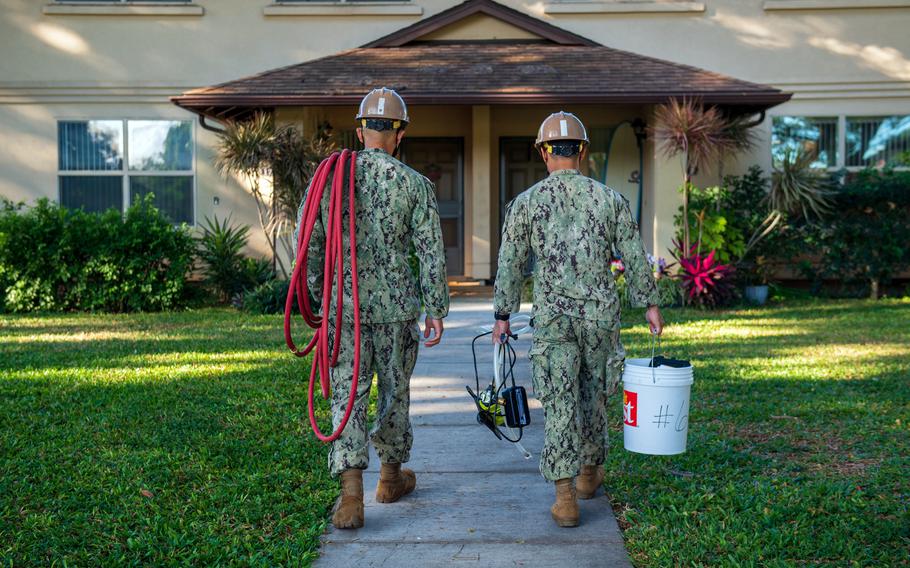
Sailors walk toward a home on Joint Base Pearl Harbor-Hickam, Hawaii, Feb. 19, 2022, to conduct a field team home visit in the wake of the November 2021 jet fuel leak at the Red Hill storage facility that caused mass drinking water contamination. (Mar’Queon A. D. Tramble/U.S. Navy)
FORT SHAFTER, Hawaii — Carolina Alama considers herself quite responsible when it comes to planning for annual income tax returns.
The retired Navy veteran, who lives on Joint Base Pearl Harbor-Hickam, Hawaii, with her three children, carefully manages withholding so that she owes little to the IRS come April 15, she said during a phone interview Wednesday.
Not this year.
Earlier this month, the Defense Finance and Accounting Service notified her that she owes $6,500 in taxes on $22,000 she received from the government to temporarily relocate her family last year after a Navy fuel leak contaminated their drinking water.
Skipping payment is not an option, Alama said, but she is particularly irked that she and thousands of other evacuees were not informed they’d be on the hook for income taxes.
“The unfair and unjust thing is that in the end we’re paying for the government’s mistake.” Alama said. “We got put out of our homes.”
Roughly 4,000 households in military residential areas were temporarily relocated during the crisis that began in late November 2021 when jet fuel from the Red Hill fuel storage facility near the joint base leaked into the Navy’s water distribution system.
Many of those who relocated are now learning from DFAS that a huge tax bill awaits, and some have taken to the Facebook page JBPHH Water Contamination Support to seek clarity, commiserate or rage against the surprise notices.
“Omg this makes me livid,” a poster named Jen Andersen recently wrote. “They poisoned us and we had to live without clean water for months and now we have to pay taxes on it?”
A poster named Teri’i Garcia said her income tax returns were prepared last week.
“We usually get around 6000 back due to the child tax credits but this year we owe 2000,” she wrote.
The bump in income also pushed her into a higher tax bracket, wrote Garcia, who did not respond to a request for an interview.
Alama, like many others, received a Form 1099 from DFAS indicating that the $22,000 spent for her family’s relocation was considered “other income.” Her tax preparer told her that she owes $6,500 in taxes on that income.
“Without that, it would have been like $2 that I owed to federal and $10 to state,” Alama said.
Joint Task Force-Red Hill, which is tasked with emptying the Red Hill storage facility for its permanent closure, referred questions about the tax liability to DFAS.
Stars and Stripes submitted a detailed query to DFAS on Tuesday but had not received a response as of Thursday.
The 1099 forms appear to have been sent to retirees and contractors who live in the military communities. Active-duty service members who relocated during the crisis saw the additional income reflected on their W-2 forms.
Some Facebook posters are vowing to not pay the tax.
“I feel like If they want to tax us on something that was their fault and caused us to have to leave our homes,” wrote a poster named Lindsay Lou, “they can take us to court for it.”